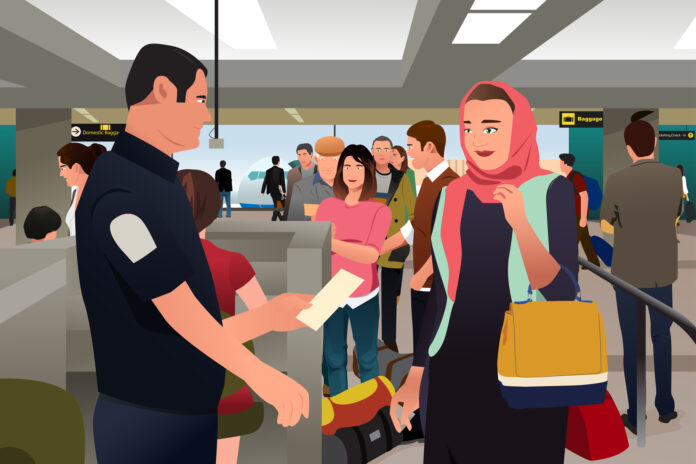I have been an avid traveller—an Indian passport holder who has crossed borders into over 50 countries. This passport, ranked 87th on the global mobility index, has shaped my journeys not only by where I’ve gone, but by how I’ve been seen. My experience of travel is inescapably filtered through the gaze of global hierarchies.
To hold an Indian passport is to hold a document that evokes suspicion before it offers mobility. It is a passport that requires constant justification.
Travel, though often romanticized as a form of freedom, exists a deeply colonized world. When I move through airports, embassies, and immigration lines, I cannot help but notice the smooth passage of white travellers—often with a kind of ghostlike ease, drifting through borders that scrutinize me. They carry passports that speak a language of entitlement, a legacy of empire. Their ability to cross thresholds without question often mirrors the unchecked movement of their ancestors—colonizers who entered lands without invitation, without visas, without consequence.
The irony is sharp. Those who once imposed borders now glide through them; those whose lands were colonized must now beg for entry—offering bank statements, employment letters, and detailed itineraries as proof of worthiness.
In 2024 alone, Indian travellers lost ₹136 crore in Schengen visa rejections, a figure that doesn’t capture the emotional toll: the waiting, the uncertainty, the humiliation. I’ve known that nervousness intimately—the fear of rejection, the obsessive re-checking of documents, the rehearsed politeness at immigration counters. In one recent visa application, we submitted over 75 pages of documents; as my partner joked, “Only our horoscopes were left to be verified.”
And even when a visa is granted, the story does not end.
A visa is not permission—it is a possibility. Entry is still at the discretion of an immigration officer, and approval rests on the performance of non-threat: you must appear innocent, trustworthy, non-resource-consuming.
Despite the revenue we bring through tourism, we are too often seen as potential burdens—suspect bodies that must prove their right to be present.
I recall travelling through South America, where buses were filled with carefree white tourists. My brown partner and I were the only ones regularly stopped and checked. We learned to pretend to be asleep—to evade the fatigue of scrutiny, of having to constantly offer up our documents like confessions.
Sometimes, in these moments of irony and exhaustion, an image comes to me: What if the colonized had demanded documentation? What if the British had been asked to show proof of return? Proof they would not consume the resources of the lands they entered? What if there had been visa forms, stamped denials, immigration officers in Calcutta, Lagos, or Cairo?
Of course, there were none. The colonizers entered with entitlement, took what they wanted, and left behind borders, passports, and systems of exclusion. Today, these systems continue to perform the work of empire—not through conquest, but through bureaucratic control over who gets to move, and who must stay.
Jacques Derrida, the post-structuralist philosopher, offers us a powerful way to think about these tensions. In his reflections on hospitality, Derrida distinguishes between conditional hospitality—the kind that immigration systems operate on—and the ethical ideal of unconditional hospitality. Conditional hospitality is hospitality with rules: it demands identity, documentation, reassurance. It is the hospitality that asks, “Who are you? Are you safe? Are you worthy?” before it opens the door. It is a selective welcome—one that protects the host’s sovereignty above all else.
Unconditional hospitality, in contrast, is the radical openness to the Other. It asks us to welcome without knowing, without needing assurance, without limits. But Derrida warns us: this kind of hospitality is structurally impossible within the frameworks of the nation-state. The state, by definition, must regulate entry to preserve itself.
And so, we live in a permanent contradiction—where the ethical command to welcome the Other is constantly at odds with the political imperative to control the border.
To hold an Indian passport, then, and to move through the world with it, is to live this contradiction daily. It is to be the Other in Derrida’s formulation: the one who arrives knocking, always almost-welcome but never quite at home. The one who is questioned not because they have done something wrong, but because their very presence must be verified.
Derrida would not offer a solution—but he would urge us to remain with the discomfort. He would ask: What ghosts of empire live in this border? What histories are replayed in the visa line? What does it mean that some move freely, while others must beg for passage? In these questions, we glimpse the deeper mechanics of modern mobility—not as neutral infrastructure, but as the afterlife of empire.
From a decolonial perspective, this is not just about inconvenience or red tape. It is about the ongoing logic of colonization—one that governs who is let in, who is held back, and who is deemed suspicious even in their innocence. Immigration policies, visa regimes, and border controls are not merely tools of security—they are performances of global inequality, where the colonizer’s descendants still travel freely, and the colonized must still justify their presence.
Sugandh Dixit
I received my doctoral training in clinical psychology from Duquesne University, Pittsburgh USA. I have worked with survivors of interpersonal violence at Sakhi for South Asian Women, New York, and worked with students at the Carnegie Mellon University Counseling center, Pittsburgh and Pace University counseling center, New York. Most recently, I was the Program Leader for the community mental health program at Bapu Trust, Pune, where I work from a socio-psychological lens with individuals from low-income neighborhoods.

